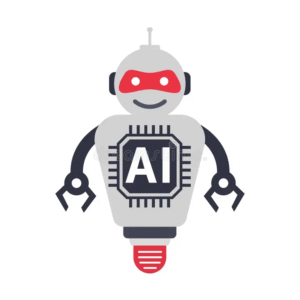the employment-related question on millions of people’s minds is “Will AI take my job?”
To be honest, I don’t know if your job is safe from AI disruption. It took most of my work away, which was freelance writing, but here I am doing something different which utilizes my thinking and creativity. This is an example of how you could survive in a job market surrounded by AI disruption.
Artificial intelligence is changing the job market at breakneck speed. Millions of legacy workers and those entering the workforce are wondering what their employment future will look like.
Of course you’re wondering which careers are safe from automation—and which ones are potentially on the chopping block. This FAQ breaks it down.
Here are the most commonly asked questions answered about AI and your employment prospects. Hopefully, these answers will help you feel informed rather than anxious.

What are my odds of AI job loss?
It depends on what you do and how you do it.
Most likely AI will replace you if your regular employment tasks are highly repetitive and require little thinking. The thing is, boring and mundane jobs are the easiest for AI to mechanize. The less you need to think and apply human intuition and creativity, the more risk to your job.
Some jobs won’t disappear entirely, but they’ll be augmented by AI tools. In this case, you could hang onto your employment by upgrading your AI skills. This makes your work more relevant and valuable to your employer.
AI is constantly evolving and improving, so there’s no predicting at any time what it’ll be capable of in the future. That said, let’s start with a short list of jobs that are most vulnerable for human replacement as of press time:
Which Jobs Are at the Highest Risk of Disruption From AI?
Telemarketers
For decades, this was a popular sideline for SAHM (stay at home moms) and other housebound people. Expect it will be overtaken by AI chat and voice bots.
Would you buy from a bot? Cash Cuddling companies looking to save money using robo-callers rather than humans would take a chance.
Customer Service Reps
Pretty much all of us already “talked” to an AI customer service rep. More complicated support requests are often sent to a human service agent, but for how long? There’s no telling if will humans remain employed as support agents.
Proofreaders and copy editors
AI understands context now, and can do more than flag typos. Unfortunately for us humans, automated tools like Grammarly and ChatGPT do all this stuff faster, and oftentimes with more accuracy.
Copywriters and other content creators
In my professional, writerly opinion, chat-bot content is darned good quality, and bot output keeps improving all the time. Bot training is key for good results. My solution is not to fight the AI trend, but to work with AI.
Data Entry Clerks
Paralegals & Legal Assistants
Basic Coding Tasks
Bookkeepers and Accountants
Market Research Analysts
Retail Cashiers
It’s not just Walmart; this trend is spreading to retail everywhere. Self-checkout lanes are becoming more popular all over. (I know I deserve a slap, but I like them because I get out faster.)
Journalism and basic news reporting
Graphic Design
Translators (to interpret basic standard texts)
Truck Drivers and Deliverers
Demand for human drivers will be lower, but will not entirely disappear. It’s costly to mechanize this type of work.
I predict that the trades like plumbing will remain AI-resistant and trade school will make a comeback for some people entering the workforce. I will admit that AI can and does advise me, but it can’t unclog my sink.
Here are AI-resistant careers for you and/or your children to consider for stable future employment :
Shrinks and Other Licensed Mental Health Professionals
Would you bare your soul to a bot? You’d save money on mental health services, but won’t get a hug after the session. Professional counselors, therapists and social workers are important mental health specialists that should be considered indispensable.
Doctors, Dentists, Nurses and Other Healthcare Workers
People who work in hospitals and doctors’ offices providing care are essential and can’t be replaced. Their services will always be in demand.
Ditto Veterinarians and Other Animal Care Specialists.
Skilled Tradespeople of all Types
Potters, Jewelers, Watchmakers and Other Hands-on Craft Persons
In-Store Sales Clerks
Cooks, Chefs, Servers and Other Food Staff
I consider food preparations of most kinds safe from AI. AI hasn’t hands to work in a kitchen to prepare a quiche or bus a table. It’s just too complicated to mechanize.
Tailors And Seamstresses
AI can’t take it in, make it longer or let it out. Seams and lengths, I mean. AI can’t measure your size or run a sewing machine. Altering clothing is a hands-on job for garment specialists.
Union membership might stop or delay some of these changes. It’s often best to join a union, if it’s available.